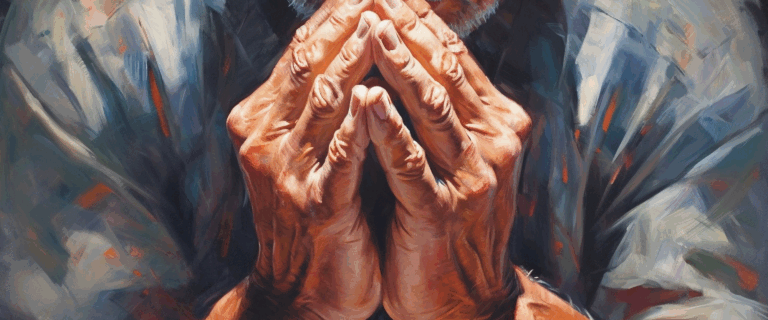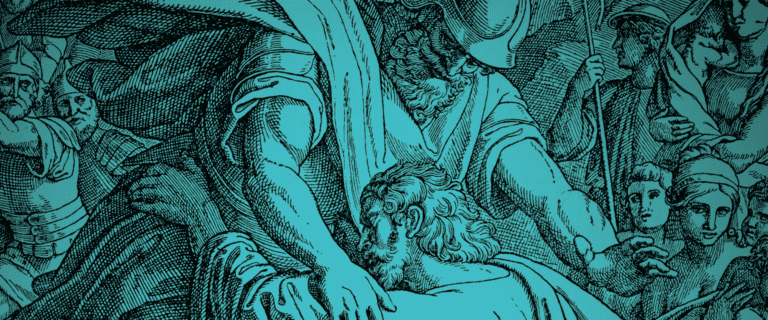This reflection is condensed and excerpted from episode 255 of Candid Conversations with Jonathan Youssef. Subscribe today on your favorite podcast platform or listen online at LTW.org/Candid.
The story of Jacob’s wrestling with God is one that’s always intrigued me. It’s multifaceted and multidimensional—and it’s a little bit dangerous in that there is potential to misunderstand or misrepresent it.
Men and women have been “dislocated” to different degrees and in different ways because of the work of God in their lives.
Jacob has been at odds with his brother since birth. Even in the womb, he and Esau wrestled with each other (see Genesis 25). Later, Jacob was at odds with his father over who should have the birthright and blessing in the family. And to achieve his purposes, Jacob consistently used trickery and deception (see Genesis 27-31).
Later, however, we begin to see the undoing of Jacob. He’s being changed and transformed as he serves his crooked Uncle Laban for twenty-some-odd years, and in many ways, he’s echoing the story of the prodigal son. Having come to himself, he’s returning home—home to the land of his father and his older brother. But, although God has begun to work in him spiritually, it becomes clear that God is not finished with Jacob yet.
RETURNING
Genesis 32 unfolds with three dramatic pictures. First, we have the picture of Jacob returning (vv. 1-21). Angels come and meet Jacob, serving as confirmation that the Lord is with him. He names the area Mahanaim, meaning two camps, which may be referring to the fact that it’s his camp and the Lord’s camp. The Lord’s camp serves as his shield and protection because he’s going to need it.
Soon Jacob hears that Esau’s on his way with four hundred men. Either Esau is rolling out the red carpet for his little brother, or he has come for vengeance, having not forgotten twenty years of anger and hostility. Jacob was afraid and distressed (see v. 7). He cannot go back to his Uncle Laban; he’s terrified to go forward to his brother, Esau. What’s he going to do?
The old Jacob probably would have used skill and trickery to weasel his way out of this situation. He would have found a crafty way to save himself—even at the cost of his own family. But he’s a different man now, and he perseveres and pleads with God. His prayer shows us that he’s depending on God and His faithfulness: “God, You promised to be with me and protect me. I’m coming to You, claiming those promises.” Jacob is at the end of his resources and trusting in the Lord to act.
In addition to his expressed faith, Jacob exhibits an attitude of repentance. That’s what’s happening with this whole procession of people and animals bringing the message to Esau: “These gifts are from your servant, Jacob.” It is a powerful sign of a repentant heart when you are prepared to go to the person whom you have offended and say, “Because of what the Lord has done in me through the power of Jesus Christ, I can come before you and serve you.” Scripture is clear that repentance is God’s work of grace in my heart. I am sorry for my sin and receive God’s forgiveness, but I’m also working toward restoration, repairing whatever damage I have caused.
WRESTLING
The second dramatic picture in Jacob’s journey home is his wrestling. He’s not only sent his possessions on ahead but also his whole family (see Genesis 32:22-23). He’s all alone now, and a man grabs him in the darkness and begins to wrestle with him (see v. 24). Whom do you think Jacob thinks he’s wrestling? Most likely, Jacob thinks he’s wrestling the man who swore to kill him, the man that all of this fuss is about: Esau. Jacob thinks his most significant conflict is with Esau.
But that is not whom he wrestles with in the night. We find out that Jacob is, in fact, wrestling with a manifestation of God in the flesh, a pre-incarnate Christ. Why? What did God stand to gain from wrestling with Jacob? While Jacob has given all he has back, he has yet to give back the most important thing: himself. Jacob may think that Esau is trying to exact revenge, but in reality, God is wrestling with Jacob to take what is His—Jacob!
God wrestles with Jacob gently like a father with a child; a father can keep the match going for a long time so that he never loses and the child never loses. But finally God touches Jacob’s hip, dislocating it and making it impossible to continue. Then Jacob clings to God, saying, “I’m not going to let You go unless You bless me.” In the context of Jacob’s day, the lesser is always blessed by the greater, so because of the power that’s rendered his hip inoperable, Jacob is acknowledging that he is holding onto the greater being—and he wants His blessing.
God says to him, “What is your name?” And the response is one word: Jacob—meaning twister, deceiver, heel-clutcher. God is getting to the heart of the issue. In saying his name, Jacob is confessing: “I am unrighteous; I am a sinner.” Jacob’s identity was in whom he could trick and how he could trick them. But God wants Jacob’s heart and is prepared to dislocate Jacob’s hip to get it.
That may be how God is working in your life. He may be pursuing your heart through the divine dislocation of something that you take pride in, something that is a source of great strength for you. Maybe God’s touched the very thing on which you have depended for your life, and He’s taken it away from you. That’s what’s happening to Jacob. The Lord is drawing him in to say, “Jacob, it’s not all the things in your life that I want; it’s you that I want—your heart.”
LIMPING
The third picture is a beautiful scene. In Genesis 33, Jacob returns to Esau, but he’s not at the back of the caravan like he had planned. He’s at the front now, and he’s prepared to take it all. He bows before Esau and submits to him as a servant. But I think if you had been there that day to watch this encounter, those would not have been the two things that you would have paid attention to. I think the thing that would have captured your attention would have been Jacob’s limp.
Why is this significant? Because this is a picture of the Christian life. Men and women have been “dislocated” to different degrees and in different ways because of the work of God in their lives. He has given them a limp, so to speak, to humble them under His sovereign, mighty hand, that they might be conscious of their weakness and depend on the Lord for the rest of their lives—for His glory and their eternal good.
This wrestling and crippling takes us to the heart of the Gospel. You see, another night, centuries later, two wrestlers engaged—this time the Son of God with His heavenly Father with an equality in the wrestling. It was in this tense, stressful moment that Christ prayed, “My Father, if it is not possible for this cup to be taken away unless I drink it, may your will be done” (Matthew 26:42). Jesus refused to let go despite what was coming—the agony and shame of the cross. He held on to the Father for our blessing, which is why, as He poured out His life at Golgotha, He said, “Father, forgive them, for they do not know what they are doing” (Luke 23:34). Christ became a curse for us, that we might receive all the blessing (see Galatians 3:13-14).
Share
Recent MY Journal

The Signal That Cannot Be Silenced: Celebrating 17 Years of THE KINGDOM SAT
March 4, 2026

4 Ways Progressives Are Handing the West Over to Islamists
February 23, 2026
Sign Up for Ministry Updates
You might also like

Christian Living
He Uplifts the Humble
December 5, 2025
Obedience and Surrender
3 Keys to Uncover God’s Vision for Your Life
January 3, 2023
Obedience and Surrender
Stop Mudslinging. Start Loving.
March 1, 2022



